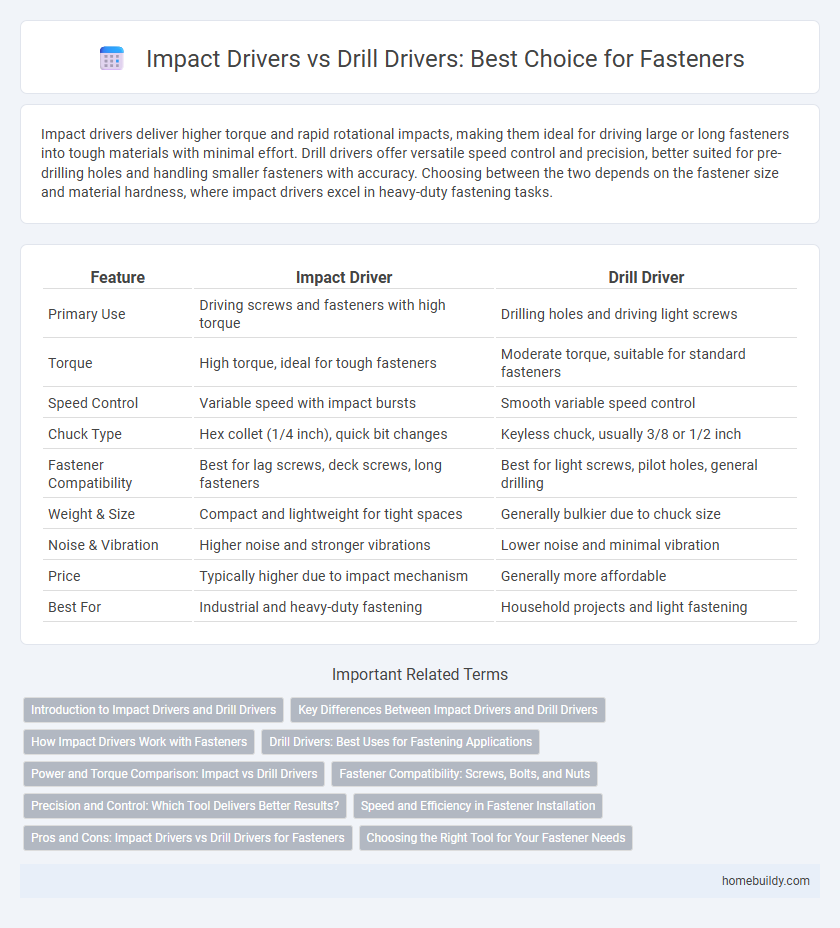Impact drivers deliver higher torque and rapid rotational impacts, making them ideal for driving large or long fasteners into tough materials with minimal effort. Drill drivers offer versatile speed control and precision, better suited for pre-drilling holes and handling smaller fasteners with accuracy. Choosing between the two depends on the fastener size and material hardness, where impact drivers excel in heavy-duty fastening tasks.
Table of Comparison
| Feature | Impact Driver | Drill Driver |
|---|---|---|
| Primary Use | Driving screws and fasteners with high torque | Drilling holes and driving light screws |
| Torque | High torque, ideal for tough fasteners | Moderate torque, suitable for standard fasteners |
| Speed Control | Variable speed with impact bursts | Smooth variable speed control |
| Chuck Type | Hex collet (1/4 inch), quick bit changes | Keyless chuck, usually 3/8 or 1/2 inch |
| Fastener Compatibility | Best for lag screws, deck screws, long fasteners | Best for light screws, pilot holes, general drilling |
| Weight & Size | Compact and lightweight for tight spaces | Generally bulkier due to chuck size |
| Noise & Vibration | Higher noise and stronger vibrations | Lower noise and minimal vibration |
| Price | Typically higher due to impact mechanism | Generally more affordable |
| Best For | Industrial and heavy-duty fastening | Household projects and light fastening |
Introduction to Impact Drivers and Drill Drivers
Impact drivers deliver high torque through concussive rotational force, making them ideal for driving large fasteners or loosening tough screws in construction and automotive applications. Drill drivers provide versatile performance with adjustable speed and torque, suitable for drilling holes and driving smaller fasteners in woodworking and general DIY projects. Understanding the distinct mechanisms--impact drivers use hammering action while drill drivers rely on steady rotational motion--is essential for selecting the right tool for fastener tasks.
Key Differences Between Impact Drivers and Drill Drivers
Impact drivers deliver higher torque and are designed specifically for driving large fasteners with minimal effort, making them ideal for heavy-duty fastening tasks. Drill drivers provide versatile functionality with adjustable speed and torque, suitable for both drilling holes and driving screws in lighter applications. Impact drivers use concussive rotational force for loosening tough fasteners, whereas drill drivers rely on steady rotational force without impact.
How Impact Drivers Work with Fasteners
Impact drivers deliver high torque through rapid concussive blows, allowing fasteners to be driven quickly and securely into tough materials. Their hex collet specifically grips hex-shanked bits, optimizing control and reducing cam-out when fastening screws and bolts. This mechanism makes impact drivers ideal for driving long, large-diameter fasteners where standard drill drivers might struggle.
Drill Drivers: Best Uses for Fastening Applications
Drill drivers excel in fastening applications that require precision and control, making them ideal for light to medium-duty tasks like assembling furniture or installing drywall. Their adjustable clutch settings prevent over-driving screws and minimize damage to materials. With variable speed control and compatibility with various drill bits, drill drivers offer versatility for both drilling holes and driving fasteners efficiently.
Power and Torque Comparison: Impact vs Drill Drivers
Impact drivers deliver significantly higher torque than drill drivers, making them ideal for driving large fasteners and heavy-duty applications. Drill drivers provide moderate torque suitable for precision tasks and lighter fastener installation. The higher RPM and hammering action in impact drivers enhance their power output, enabling faster and more efficient fastening in tough materials.
Fastener Compatibility: Screws, Bolts, and Nuts
Impact drivers deliver high torque ideal for driving screws, bolts, and nuts quickly without stripping fasteners, making them highly compatible with tough fastening tasks. Drill drivers offer greater versatility for drilling holes and driving screws but may struggle with larger bolts and heavy-duty nuts due to lower torque output. Choosing the right tool depends on the fastener type and application, with impact drivers preferred for heavy fastening and drill drivers suited for lighter fastener work.
Precision and Control: Which Tool Delivers Better Results?
Impact drivers excel in delivering high torque with rapid bursts, making them ideal for driving large or stubborn fasteners quickly but can sacrifice precision due to their aggressive rotational force. Drill drivers offer greater control and accuracy with adjustable speed settings, better suited for delicate tasks and precise screw placement, especially in softer materials or pilot holes. For users prioritizing precision and fine control over speed and power, drill drivers generally deliver better results in fastening applications.
Speed and Efficiency in Fastener Installation
Impact drivers deliver higher torque and faster rotational speed, making them ideal for driving large or stubborn fasteners quickly and efficiently. Drill drivers provide more variable speed control and are better suited for drilling pilot holes or installing smaller fasteners with precision. For rapid fastener installation in heavy-duty applications, impact drivers significantly reduce installation time and user fatigue.
Pros and Cons: Impact Drivers vs Drill Drivers for Fasteners
Impact drivers deliver higher torque and rapid bursts suitable for driving tough fasteners in hardwood and metal, reducing user fatigue, but they often produce more noise and offer less precision than drill drivers. Drill drivers provide better control and versatility for drilling and fastening in softer materials, allowing adjustable clutch settings to prevent overdriving, yet they may struggle with larger or stubborn fasteners. Choosing between impact drivers and drill drivers depends on the fastener size, material type, and required torque for the specific fastening task.
Choosing the Right Tool for Your Fastener Needs
Impact drivers deliver high torque and rapid rotational force, making them ideal for driving large, tough fasteners quickly and efficiently. Drill drivers offer versatility with adjustable speed settings and are better suited for precise drilling and driving smaller fasteners or delicate materials. Selecting the right tool depends on fastener size, material hardness, and application requirements to ensure optimal performance and avoid damaging the fastener or work surface.
impact drivers vs drill drivers (for fasteners) Infographic

 homebuildy.com
homebuildy.com